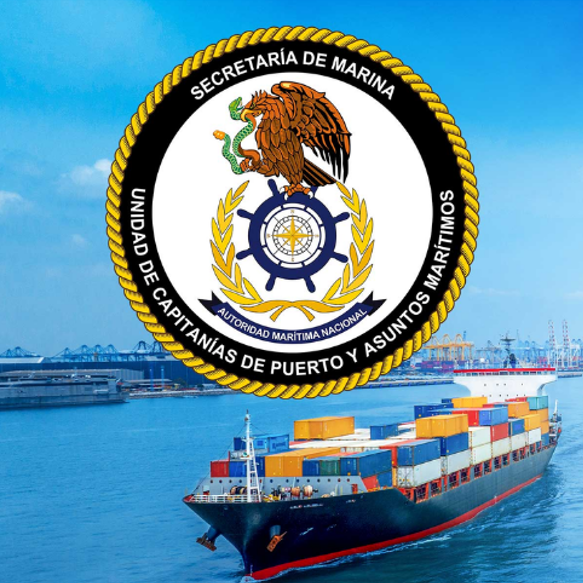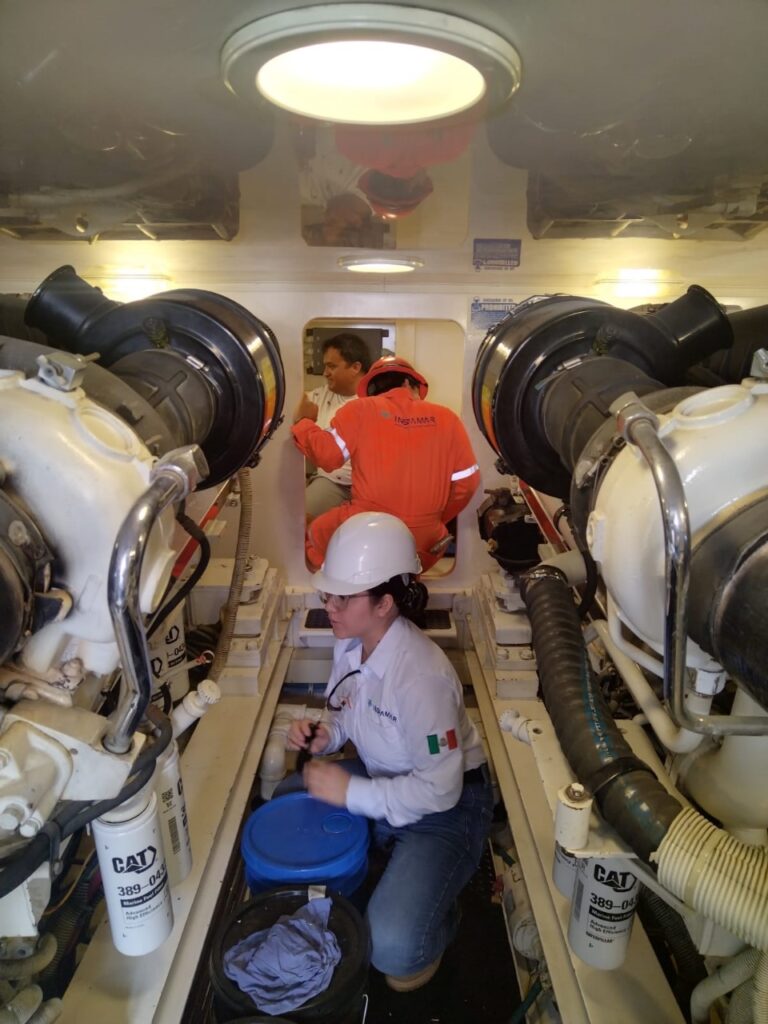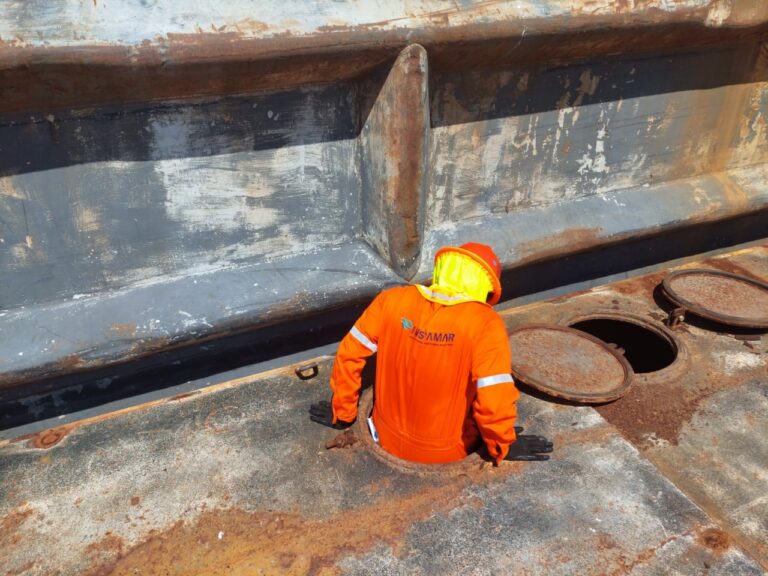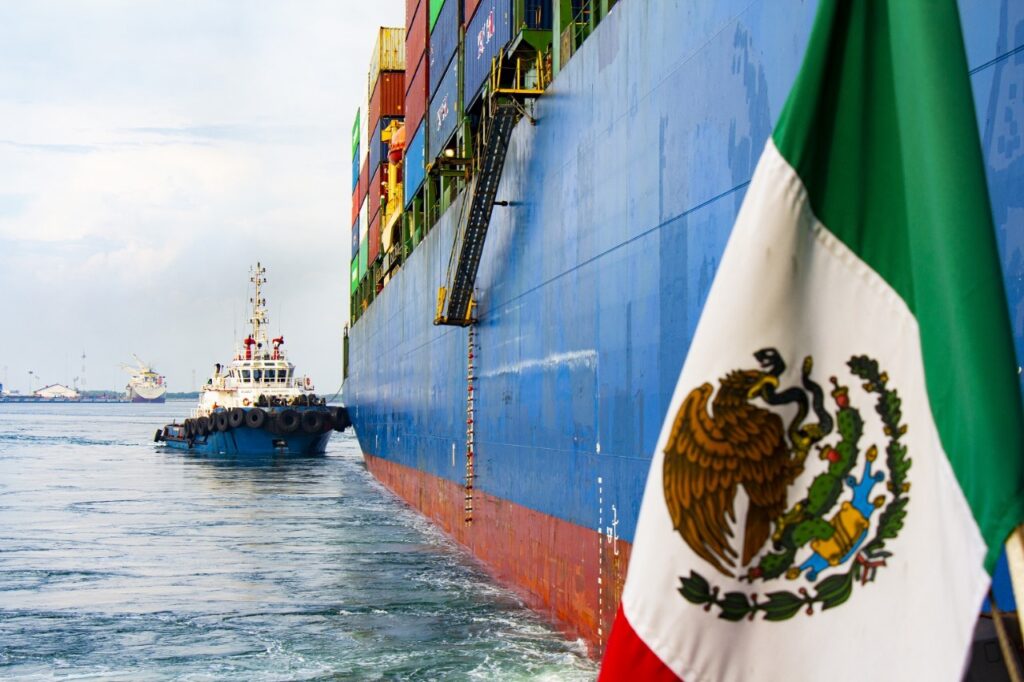
Inspamar – 2025
What is the National Maritime Authority (AMN) and how is it structured?
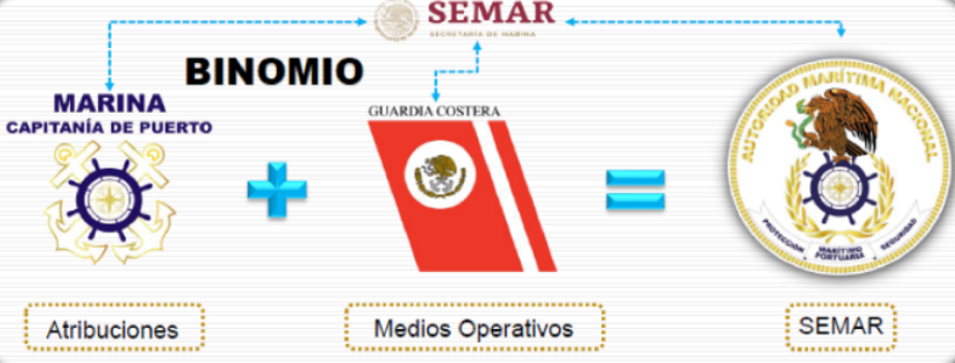
As of June 17, 2017, a partnership was formed to provide maritime security and protection in Mexico's Marine Zones and ports by combining the powers of the Port Captaincies with the resources of the Ministry of the Navy in its Coast Guard functions; strengthening the concept of the National Maritime Authority, with the aim of simultaneously increasing security and protection for the country's productive activities and the flow of maritime trade.
What is the AMN?
The National Maritime Authority (AMN) is exercised by the Federal Executive through the Secretariat (The Ministry of the Navy), for the exercise of sovereignty, maritime and port protection and security, as well as the maintenance of the rule of law in Mexican marine zones, coasts, ports, port facilities, terminals, marinas, and national port installations, without prejudice to the powers that correspond to other agencies (Navigation and Maritime Trade Law, Last amendment published in the Official Journal of the Federation on 07/12/2020).
In accordance with Chapter II, Article 7 of the Navigation and Maritime Trade Law (Last amendment published in the Official Journal of the Federation on 07/12/2020), the Authorities in maritime merchant matters will be:
I. The Secretariat, either directly or through the port captaincies.
II. The captains of Mexican merchant vessels.
III. The Mexican consul abroad, accredited at the port or location where the vessel requiring the intervention of the authority is located, for the cases and purposes determined by this Law.
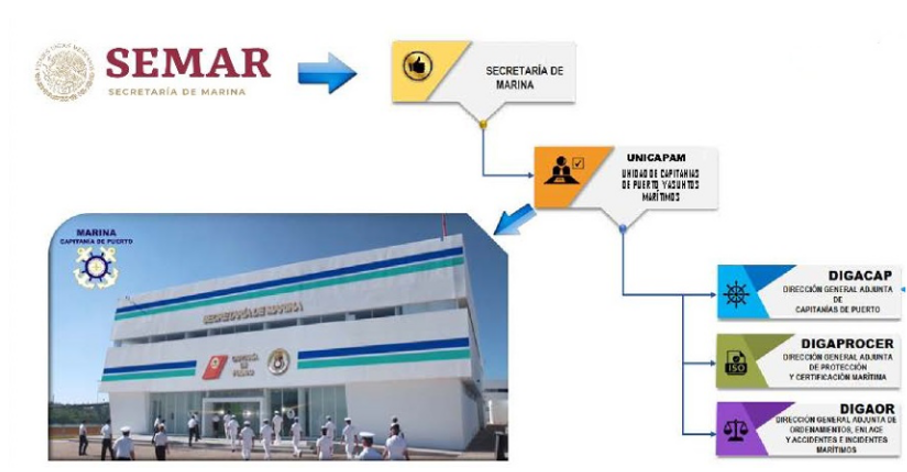
DECREE By which various provisions of the Interior Regulations of the Ministry of the Navy are amended, added, and repealed (DOF: 01/12/2017).
Article 3, Section II, C Bis. Unit of Port Captaincies and Maritime Affairs.
How is the UNICAPAM structured?
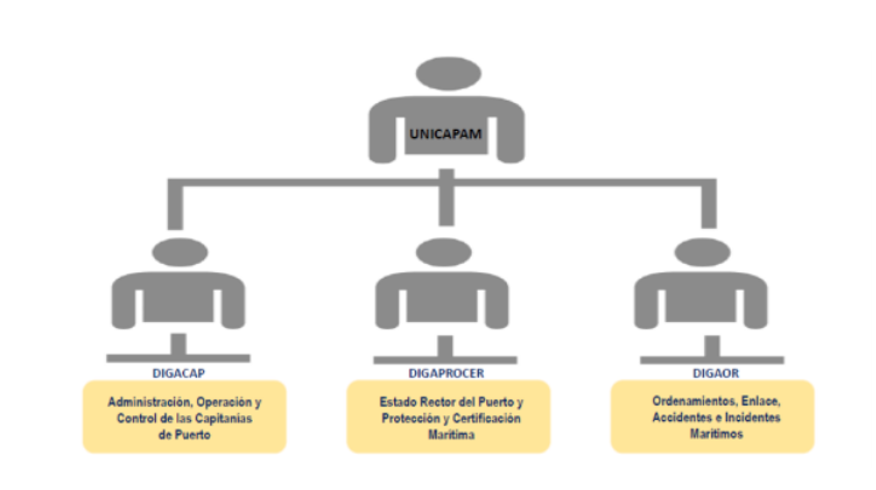
The Unit of Port Captaincies and Maritime Affairs (UNICAPAM) is structured into three General Directorates.
I. Deputy General Directorate of Port Captaincies (DIGACAP): It is responsible for the administration, operation, and control of the port captaincies.
It has 2 Departments and 6 Area Subdepartments.
II. Deputy General Directorate of Maritime Protection and Certification (DIGAPROCER): Responsible for managing activities related to maritime and port protection, safeguarding maritime areas, as well as the inspection and certification of vessels and naval artifacts, in compliance with national and international regulations.
It has 2 Departments and 4 Area Subdepartments.
III. Deputy General Directorate of Regulations, Liaison, Maritime Accidents and Incidents (DIGAOR): Responsible for overseeing the adaptation of the legal framework under which UNICAPAM performs its functions; acting as a liaison with the national maritime sector and international organizations; ensuring that the investigation process for maritime accidents and incidents is carried out in accordance with national and international regulations; and serving as the entity responsible for coordinating technical cooperation and training on maritime matters.
It has 2 Departments and 5 Area Subdepartments.
Powers and Responsibilities of the AMN
I. To plan, formulate, and lead policies and programs for the development of waterborne transport, the Merchant Marine, and national ports, in compliance with the provisions set forth in this Law and other applicable legal regulations.
II. To represent the country in negotiations of international maritime treaties within its area of competence; to execute them, and to act as their interpreter in the administrative sphere.
III. To maintain the National Maritime Public Registry.
IV. To integrate statistical information on merchant maritime transport.
V. To grant navigation permits and authorizations for providing services on public waterways, in accordance with the provisions of this Law, as well as to verify compliance and revoke or suspend them if necessary.
VI. To organize, regulate, and, when applicable, provide maritime traffic control services.
VII. To regulate and oversee the safe and efficient provision of pilotage services, in accordance with this Law and its Regulations.
VIII. To organize, promote, and regulate the training and certification of Merchant Marine personnel, as well as to issue certificates of competence in accordance with this Law and its Regulations; to oversee compliance and revoke or suspend them if necessary.
IX. To regulate and oversee navigational safety and the safeguarding of human life at sea.
X. To establish Maritime and Port Protection Measures, in accordance with the provisions of the Ports Law.
XI. To establish the regulatory framework for rates in the provision of maritime services within national territory, including coastal and inland navigation services, when, in the opinion of the Federal Economic Competition Commission, there are no conditions for effective competition.
XII. To request the intervention of the Ministry of Economy when there is suspicion of international commercial practices that violate national legislation on foreign trade, as well as International Treaties.
XIII. To request the intervention of the Federal Economic Competition Commission when there is suspicion of practices that violate the Federal Economic Competition Law, as well as to assist in the corresponding investigation.
XIV. To impose sanctions for violations of this Law, its regulations, and applicable International Treaties in the matters within its scope, in accordance with this regulation.
XV. To register and flag vessels and naval artifacts as Mexican.
XVI. To certify signatures and issue seafarer books and maritime identity cards for the crew of the Mexican Merchant Marine.
XVII. To oversee that public waterways and navigation comply with safety conditions and maritime signaling requirements.
XVIII. To oversee navigational safety and the protection of human life at sea.
XIX. To organize, regulate, and, when applicable, provide navigation aid and maritime radio communication services.
XX. To inspect and certify Mexican vessels and naval artifacts, as well as service and waste reception facilities, ensuring compliance with International Treaties, national legislation, regulations, and Mexican official standards regarding navigation safety, the protection of human life at sea, and pollution prevention.
XXI. To inspect foreign vessels and naval artifacts, in accordance with the applicable international treaties within its area of competence.
XXII. To grant authorization to third-party inspectors to verify and certify compliance with the standards set forth in International Treaties and applicable national legislation, while maintaining supervision over these individuals.
XXIII. To establish and organize a surveillance, security, and assistance service for navigation in Mexican maritime zones.
XXIV. To conduct investigations and actions, designate professionally qualified experts in the matter in accordance with the respective regulations, and issue reports on maritime accidents and incidents in any navigable waterway.
XXV. To collaborate within its area of competence with labor authorities to ensure the resolution of labor-related maritime conflicts.
XXVI. To appoint and remove port captains.
XXVII. To direct, organize, and carry out search and rescue operations for the protection of human life at sea in Mexican maritime zones, as well as to coordinate assistance and salvage efforts in the event of accidents or incidents involving vessels and in port facilities.
XXVIII. To compile statistical information on accidents in Mexican maritime zones.
XXIX. To manage the national registers of seafarers and vessels, in accordance with the provisions of the respective regulations.
XXX. Those established by other applicable legal provisions.
